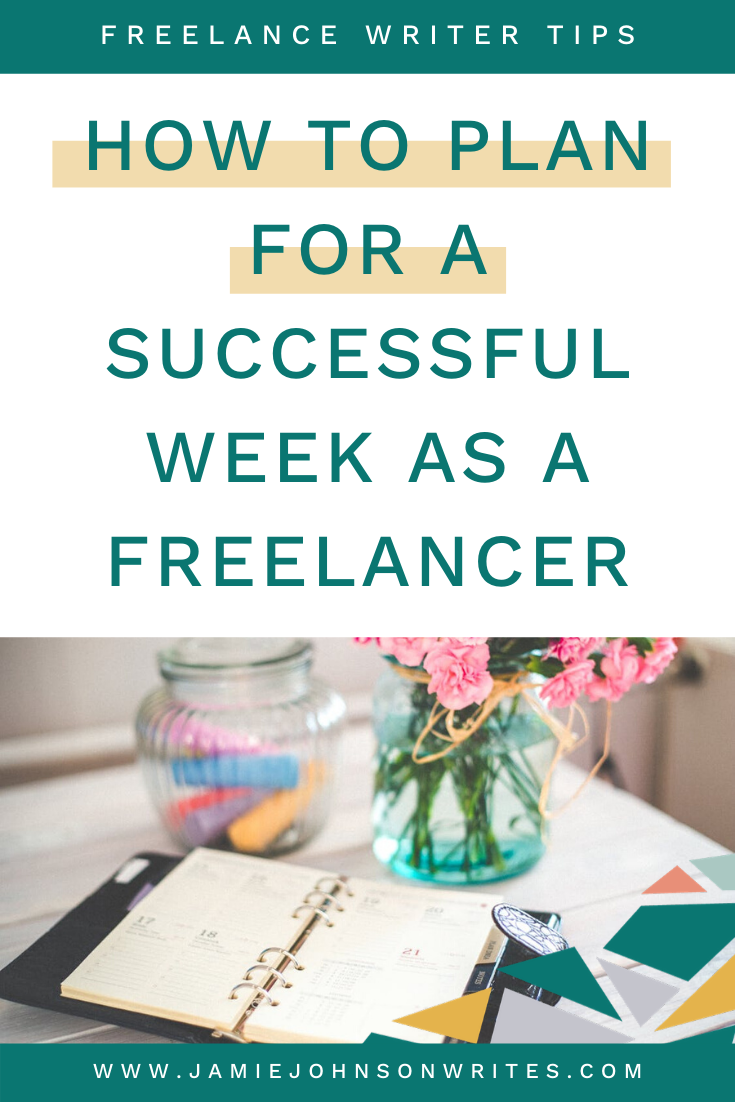How to Plan for a Successful Week as a Freelance Writer
If you want to be a successful freelancer, then you’re going to have to get really good at managing your time. You can make an amazing living as a freelance writer, but only if you actually do the work.
Because there is nothing passive about freelance writing. If you don’t write articles, you don’t get paid. End of story.
That’s why it’s worth it to try to become a faster writer and improve your overall productivity. The more productive you are, the more money you’re going to make.
5 Ways to Plan for a Successful Week
Back in the day, I felt nothing but guilt and dread when I read blog posts like this one. That’s because I really struggled to stay on task and successfully plan anything.
But if there’s one thing I’ve learned in the past three years, it’s that there is no productivity gene. Telling yourself that you’re just “not wired that way” is a limiting belief, my friend.
Productivity is a skill that you can learn and continue to improve over time. With that in mind, here are my five best tips to plan for a productive week.
1. Do a braindump and plan out your week on Sunday
Every Sunday, I like to take 30 minutes to braindump everything that needs to be done the following week.
This list includes everything I have going on that week -- articles I need to write, calls I have scheduled, things I want to do with my family, etc.
Once I have everything down on paper, I can begin planning out my week. Personally, I keep my weekly schedule on a Trello board.
I prefer Trello because it gives me a bird’s eye view of my week, and it makes it easy for me to move the cards around if plans should change.
One thing I have learned is to be realistic about what you can actually accomplish in a given week. And I don’t fill up every minute of my day with activities.
2. Prepare the night before
If I want to have a productive day I need to prepare everything I can the night before. This usually looks like:
Making my breakfast (yes, 12 hours ahead of time)
Making sure the Keurig has water in it
Charging my laptop so it’s ready to go
Picking out my clothes for the next day
Most importantly, being in bed by 10:00 PM
Doing all of this ensures that when my alarm goes off at 5:30 AM, I have zero excuses not to get up. This step sounds so easy, but it’s usually the one I want to skip the most.
It’s easy to settle onto the couch with a bowl of popcorn and some Netflix and tell myself I can get everything done in the morning.
But I have seen time and again that a successful day really hinges on my ability to prepare the night before.
3. Prioritize your most important tasks
I have found without exception that I have to get the most difficult things done first. This is why I wake up at 5:30 AM to work on my blog.
As a writer, you would think it would be easy for me to get this done but it isn’t. I don’t get paid for my blog but I do get paid to write for my clients.
If I wait until later in the day, it is all too easy for me to prioritize client work and never get to my own writing.
What is difficult will change depending on the season of your life and your priorities. At this point, I don’t have to wake up early to exercise because I don’t have a hard time working out at noon but this may change at some point.
4. Evaluate what worked and what didn’t
I tend to set really unrealistic expectations for myself. I expect things to go exactly right the first time I try it.
But the mistakes are just as valuable as the things you have done well (if not more so) because they give you valuable insight into what is working and what isn’t.
For instance, I have learned that my workday is almost always a disaster if I check my email anytime before noon. Email is like a drug for me, I check it once and then continue wanting to check it over and over again.
Don’t be afraid to make adjustments along the way because life will happen. The point isn’t to be a drill sergeant, the point is to set yourself up for success and to enjoy the way you spend your days.
5. Don’t fall into the comparison trap
And finally, I just want to say not to compare yourself with other people. I used to constantly compare myself to other freelancers and feel bad about any of my perceived shortcomings.
I would look at someone else and think, “Oh wow, she has four kids, a coaching business, a blog, a podcast, and always looks awesome. What’s wrong with ME?”
Obviously, this type of thinking is not useful. If you see someone who is farther along than you are in their business, try to use them as a source of inspiration, NOT a reason to feel bad.
After all, if they can do it then that means you can do it too. And you’re better off being friends with that person instead of trying to compete with them.
Final Thoughts on Productivity
When you’re just getting started as a freelance writer, it’s easy to feel overwhelmed and unsure of where to start. But being successful as a freelance writer doesn’t mean you do all of the things, it means you focus on the right things.



